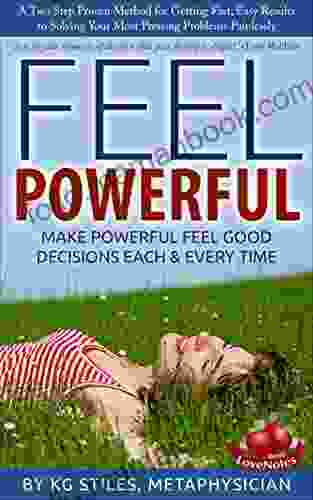Emotional intelligence, the ability to understand, use, and manage our emotions effectively, is a key component of success in all areas of life. People with high emotional intelligence are better able to manage their emotions, communicate effectively, and build strong relationships. They are also more resilient in the face of adversity and more effective in their work.
There are many things we can do to improve our emotional intelligence. Here are a few practical ideas:
4 out of 5
| Language | : | English |
| File size | : | 14868 KB |
| Print length | : | 96 pages |
1. Identify your emotions
The first step to managing your emotions effectively is to be able to identify them. This can be difficult, especially if you are not used to paying attention to your feelings. However, there are a few simple techniques that can help.
- Pay attention to your body. When you are feeling an emotion, your body will often give you clues. For example, if you are feeling angry, you may feel your heart racing or your face flushing. If you are feeling sad, you may feel a lump in your throat or tears in your eyes.
- Name your emotions. Once you have identified the physical sensations that are associated with a particular emotion, you can start to name the emotion. This can be helpful in understanding what you are feeling and why.
- Journal about your emotions. Keeping a journal can be a great way to track your emotions and learn more about yourself. When you journal, simply write down what you are feeling, what you think is causing the emotions, and how you are coping with them.
2. Manage your emotions
Once you can identify your emotions, you can start to manage them more effectively. This does not mean suppressing or ignoring your emotions, but rather finding healthy ways to express and cope with them.
- Allow yourself to feel your emotions. It is important to allow yourself to feel your emotions, both positive and negative. If you try to suppress or ignore your emotions, they will only come out in unhealthy ways.
- Find healthy ways to express your emotions. There are many healthy ways to express your emotions, such as talking to a friend or family member, writing in a journal, or exercising.
- Learn to cope with difficult emotions. There are a number of coping mechanisms that can help you to deal with difficult emotions, such as relaxation techniques, cognitive restructuring, and seeking professional help.
3. Communicate your emotions effectively
Being able to communicate your emotions effectively is essential for building strong relationships. When you communicate your emotions clearly, others are more likely to understand and support you.
- Use "I" statements. When you communicate your emotions, it is important to use "I" statements. This will help you to take ownership of your feelings and avoid blaming others.
- Be specific about your emotions. Do not simply say "I feel bad." Instead, be specific about what you are feeling and why. For example, you could say "I feel angry because I was cut off in traffic."
- Be respectful of others' emotions. When others are communicating their emotions to you, it is important to be respectful and listen to what they have to say. Do not interrupt or try to change the subject.
4. Build strong relationships
People with high emotional intelligence are more likely to have strong relationships. They are able to build trust, communicate effectively, and resolve conflict in a healthy way.
- Be supportive. One of the best ways to build strong relationships is to be supportive of others. This means being there for them when they need you, listening to them, and offering help when you can.
- Be respectful. It is important to be respectful of others, even if you do not agree with them. This means listening to their opinions, valuing their feelings, and treating them with kindness.
- Be honest and open. Honesty and openness are essential for building strong relationships. When you are honest and open with others, they are more likely to trust you and be open with you in return.
Emotional intelligence is a key component of success in all areas of life. By following these practical ideas, you can improve your emotional intelligence and build a more fulfilling life.


















































































































